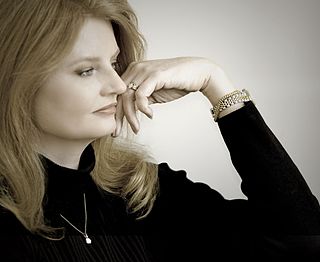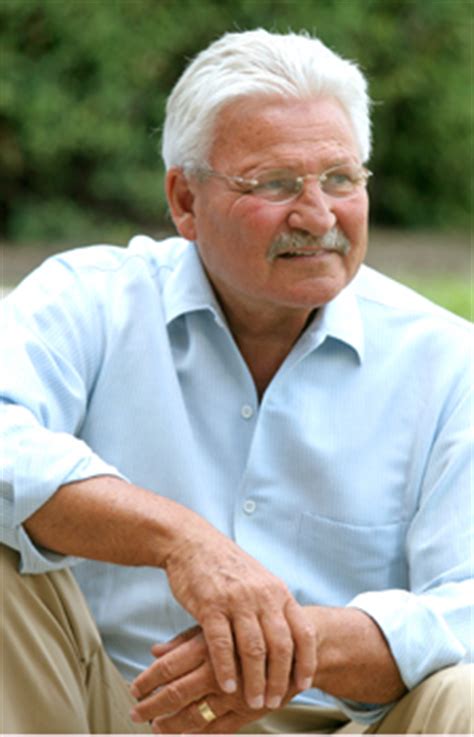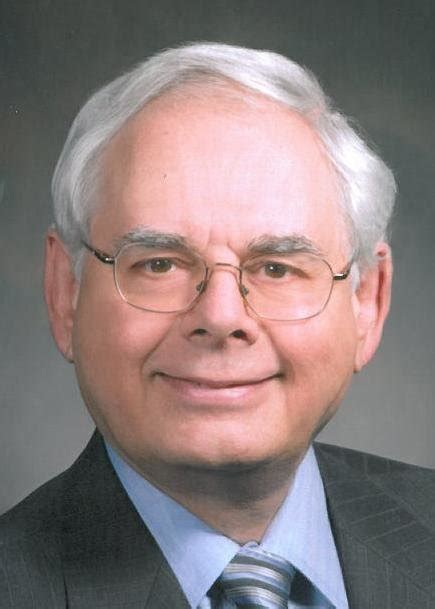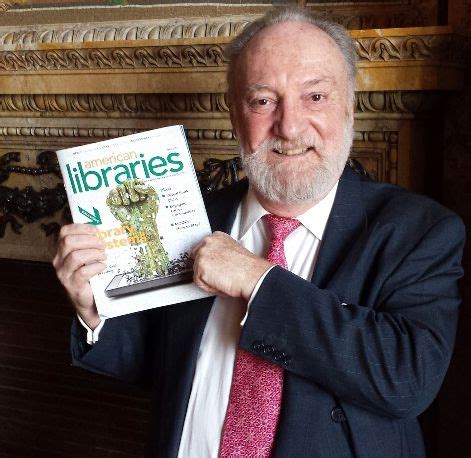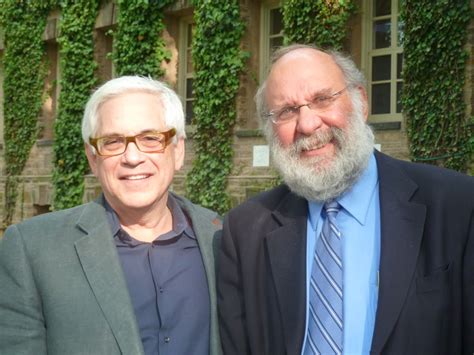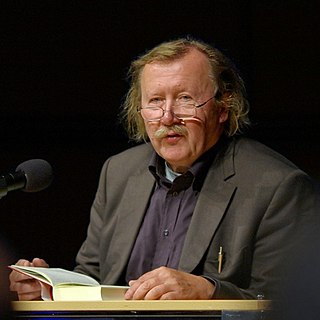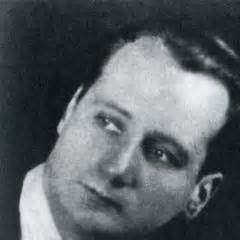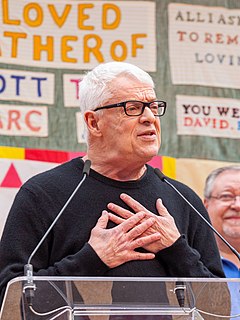Top 1200 Deep Desire Quotes & Sayings - Page 19
Explore popular Deep Desire quotes.
Last updated on November 15, 2024.
Hana, everything that God made valuable in the world is covered and hard to get to. Where do you find diamonds? Deep down in the ground, covered and protected. Where do you find pearls? Deep down at the bottom of the ocean, covered up and protected in a beautiful shell. Where do you find gold? Way down in the mine, covered over with layers and layers of rock. You've got to work hard to get to them.
Male love circuits get an extra kick when stress levels are high. After an intense physical challenge, for instance, males will bond quickly and sexually with the first willing female they lay eyes on.
Women, by contrast, will rebuff advances or expressions of affection and desire when under stress. The reason may be that the stress hormone cortisol blocks oxytocin's action in the female brain, abruptly shutting off a woman's desire for sex and physical touch.
We need to deal with three things that are important: first, we need a very deep reconsideration of how we are dealing with the economy. Second, there must be a very deep reconsideration of our way of life. We cannot simply adopt American-style consumer culture. To Islamize that is to de-Islamize Islam.Thirdly, it is important for us to understand the economy and the environment are common challenges for everyone. This is where the singularity of Islamic principles needs to join the universal values that we share with others.
What makes the strength of the soldier isn't the energy he uses trying to intimidate the other guy by sending him a whole lot of signals, it's the strength he's able to concentrate within himself, by staying centered. That Maori player was like a tree, a great indestructible oak with deep roots and a powerful radiance- everyone could feel it. And yet you also got the impression that the great oak could fly, that it would be as quick as the wind, despite, or perhaps because of, its deep roots.
The fortunate one uses the instrument of deep meditation and probes deep into his heart. Then the waves of love gain the depth of the ocean, and the ocean of love flows and fills the heart and thrills every particle of being. Every wave of life then flows in the fullness of love, in the fullness of divine glory, in the fullness of grace, in bliss and peace.
I enjoy writing songs that could have been written before [my time]. When I feel like I'm tapping into a deep vein in the body of American music, it gives me strength as a writer, like I'm dipping my pen into a deep ink well. That's the folk music tradition. Like Pete Seeger said, 'Everyone's a link in the chain.' It's a strong chain, so rely on it. ... I believe it takes all those great songs in the past to make your song even a little bit good.
There are a lot days where I don't know if God exists. There are a lot of days where I think the leadership of the Church is wacky, a lot of days where I really doubt why I am a part of this thing. But, down deep, I know it to be true. Down deep, I know how much I love it and that's what sort of gets me through. The churches are the pope, and its priests and its mystery and everything. I just sort of like the whole thing.
Many people don't know that I experienced a blood clot caused by deep vein thrombosis, or DVT, which is when a blood clot forms in a deep vein in the body, often the leg or thigh. I'm fortunate that my DVT was diagnosed and treated before it led to something even more serious and that's why I encourage people to talk to their doctor if they think something is wrong. I've teamed up with Janssen Pharmaceuticals to raise awareness about blood clot prevention and treatment.
All of these concoctions that we think are Mexican, are in no way reflective of the deep, incredibly old, complex and sophisticated deep regional cuisine of Mexico. Or the new modern Mexican cuisine, which has really been exploding over the last few years. I think we just have a completely misrepresented view of how good, how complex these flavors are. I think we could learn a lot more. It's a great cuisine that's really moving forward, faster than any other.
Wonder [admiratio astonishment, marvel] is a kind of desire for knowledge. The situation arises when one sees an effect and does not know its cause, or when the cause of the particular effect is one that exceeds his power of understanding. Hence, wonder is a cause of pleasure insofar as there is annexed the hope of attaining understanding of that which one wants to know. ... For desire is especially aroused by the awareness of ignorance, and consequently a man takes the greatest pleasure in those things which he discovers for himself or learns from the ground up.
Buddha says this is how one should be - no desire, because all desires are futile. They are about the future; life is in the present. All desires distract you from the present, all desires distract you from life, all desires are destructive of life, all desires are postponements of life. Life is now and the desire takes you away, farther and farther away from now. And when we see that our life is misery we go on throwing the responsibility on others, and nobody is responsible except us.
A Russian should rejoice if Poland, the Baltic Provinces, Finland, Armenia, should be separated, freed from Russia; so with an Englishman in regard to Ireland, India and other possessions; and each should help to do this, because the greater the state, the more wrong and cruel is its patriotism, and the greater is the sum of suffering upon which its power is founded. Therefore, if we really wish to be what we profess to be, we must not only cease our present desire for the growth of the state, but we must desire its decrease, its weakening, and help this forward with all our might.
If the first inward thought is not warded off, it will generate a desire, then the desire will generate a wish, and the wish will generate an intention, and the intention will generate the action, and the action will result in ruin and divine wrath. So evil must be cut off at its root, which is when it is simply a thought that crosses the mind, from which all the other things follow on.
The desire of advising has a very extensive prevalence; and, since advice cannot be given but to those that will hear it, a patient listener is necessary to the accommodation of all those who desire to be confirmed in the opinion of their own wisdom: a patient listener, however, is not always to be had; the present age, whatever age is present, is so vitiated and disordered, that young people are readier to talk than to attend, and good counsel is only thrown away upon those who are full of their own perfections.
Ancient worship . . . does truth. All one has to do is to study the ancient liturgies to see that liturgies clearly do truth by their order and in their substance. This is why so many young people today are now adding ancient elements to their worship. . . . This recovery of ancient practices is not the mere restoration of ritual but a deep, profound, and passionate engagement with truth—truth that forms and shapes the spiritual life into a Christlikeness that issues forth in the call to a godly and holy life and into a deep commitment to justice and to the needs of the poor.
All transformation begins with an intense, burning desire to be transformed. The first step in the 'renewing of the mind' is desire. You must want to be different [and intend to be] before you can begin to change yourself. Then you must make your future dream a present fact. You do this by assuming the feeling of your wish fulfilled. By desiring to be other than what you are, you can create an ideal of the person you want to be and assume that you are already that person. If this assumption is persisted in until it becomes your dominant feeling, the attainment of your ideal is inevitable.
I am dead already. Physical death will make no difference in my case. I am timeless being. I am free of desire or fear, because I do not remember the past or imagine the future. Where there are no names and shapes, how can there be desire and fear? With desirelessness comes timelessness. I am safe, because what is not, cannot touch what is. You feel unsafe, because you imagine danger. Of course, your body as such is complex and vulnerable and needs protection. But not you. Once you realize your own unassailable being, you will be at peace.
People will always have the desire to make rock and roll records, and they'll always have the desire to sell rock and roll records. Most of the people making these records do it because it is a business, and if someone says, "You can't do this", they won't complain. They'll just keep making records, but they'll get blander and blander. There'll still be rock and roll, but compared to what it really could be or ought to be, I don't think it'll be all that terrific.
Desire means you are dragged out of the moment; that creates a tension, that creates anxiety, that creates hope. And then finally hope turns sour, becomes frustration. Each hope leads you into anguish. Buddha calls it the only impurity. Cut the roots of desire, live in the moment so totally, pull yourself out of the past and don`t project yourself into the future. Let this moment be all and all. And your life will have such a purity, such a crystal-clear consciousness that right now you cannot imagine.
Life is made of moments and choices. Not all of them matter, or have any lasting impact Then there's a different kind of moment. One when things are irrevocably changed by a choice we make. A moment we will play endlessly in our minds on lonely nights and empty days So we explain it to ourselves, justify it enough to sleep. And then we bury it deep, so deep we can almost pretend it never happened. But as much as we wish it were different, the truth is, our worlds are sometimes balanced on choices we make and the secrets we keep.
We know that we need to explore desire in fiction - many say that the only way a story exists is that a character feels a strong desire - and nature is the place where creatures act on their desires in the most pure way imaginable, so maybe nature also works as a metaphor for whatever emotional troubles my characters have to negotiate. I'm interested in my characters as survivors, and maybe that works best when the old-fashioned notion of humans surviving in wilderness is not too far away.
Bitterness is like a weed. Remember how hard it always was to pull out thistles once they root? Remember how deep those roots grow, and how if you just snapped off the end of it, the plant would grow right back? You have to dig down deep inside. Let God search your heart. Let Him show you what's there and help you root out all that bitterness. Then you can pray for forgiveness.
From what deep springs of character our personal philosophies issue, we cannot be sure. In philosophers themselves we seem always able to notice some deep internal correspondence between the man and his philosophy. Are our philosophies, then, merely the inevitable outcome of the body of fate and personal circumstance that is thrust upon each of us? Or are these beliefs the means by which we freely create ourselves as the persons we become? Here, at the very outset, the question of freedom already hovers in the background.
Books come at my call and return when I desire them; they are never out of humor and they answer all my questions with readiness. Some present in review before me the events of past ages; others reveal to me the secrets of Nature. These teach me how to live, and those how to die; these dispel my melancholy by their mirth, and amuse me by their sallies of wit. Some there are who prepare my soul to suffer everything, to desire nothing, and to become thoroughly acquainted with itself. In a word, they open the door to all the arts and sciences.
Vanity is so anchored in the heart of man that a soldier, a soldier's servant, a cook, a porter brags and wishes to have his admirers. Even philosophers wish for them. Those who write against vanity want to have the glory of having written well; and those who read it desire the glory of having read it. I who write this have perhaps this desire, and perhaps those who will read it.
Lust is as it were desire and desire, will which extends beyond the natural will, passionate, not governed by the law and moderation. There are thus many forms of lust, like the many forms of sin ... Lust does not approach the soul in the form of a warlike enemy, but in the form of a friend or a pleasant servant. It suggests some sort of pleasure or illusory good. But this is only a trick by which the malicious angler strives to lead astray and catch the poor soul. Remember this when you are tempted by lust.
Philosophical argument, trying to get someone to believe something whether he wants to believe it or not, is not, I have held, a nice way to behave towards someone; also it does not fit the original motivation for studying or entering philosophy. That motivation is puzzlement, curiousity, a desire to understand, not a desire to produce uniformity of belief. Most people do not want to become thought-police. The philosophical goal of explanation rather than proof not only is morally better, it is more in accord with one's philosophical motivation.
Insecurity refers to a profoud sense of self-doubt-a deep feeling of uncertainty about our basic worth and our place in the world. Insecurity is associated with chronic self-consciousness, along with a chronic lack of confidence in ourselves and anxiety about our relationships. The insecure man or woman lives in constant fear of rejection and a deep uncertainty about whether his or her own feelings and desires are legitimate.
The purpose of life seems to be to acquaint a man with himself and whatever science or art or course of action he engages in reacts upon and illuminates the recesses of his own mind. Thus friends seem to be only mirrors to draw out and explain to us ourselves; and that which draws us nearer our fellow man, is, that the deep Heart in one, answers the deep Heart in another, - that we find we have (a common Nature) - one life which runs through all individuals, and which is indeed Divine.
Far over the Misty Mountains cold, To dungeons deep and caverns old, We must away, ere break of day, To seek our pale enchanted gold. The dwarves of yore made mighty spells, While hammers fell like ringing bells, In places deep, where dark things sleep, In hollow halls beneath the fells. The pines were roaring on the heights, The wind was moaning in the night, The fire was red, it flaming spread, The trees like torches blazed with light.
Swarmers run the risk of skittering like water bugs on the surface of life. By being quickly and constantly connected, they can avoid deep contact in time-consuming and meaningful ways... You're flitting from one place to another. You're more likely to pursue superficial engagements rather than deep pursuits. It contributes to this certain MTV approach to life where you engage in something for a few minutes and then there's a commercial... You have to get a grip on reality. Unless you know what is real-what is a real friendship and relationship-neither can have an effect on you.
Further conceive, I beg, that a stone, while continuing in motion, should be capable of thinking and knowing, that it is endeavoring, as far as it can, to continue to move. Such a stone, being conscious merely of its own endeavor and not at all indifferent, would believe itself to be completely free, and would think that it continued in motion solely because of its own wish. This is that human freedom, which all boast that they possess, and which consists solely in the fact, that men are conscious of their own desire, but are ignorant of the causes whereby that desire has been determined.
No matter how huge your loss, as long as you remain engaged with your life, the best days of your life may still be ahead of you. Don't misunderstand me: the pain of your loss will remain with you for the rest of your life. But great joy will be there right beside it. Deep sorrow and deep joy can exist within you, side by side. At every moment. And it's not confusing. And it's not a conflict.
When people give up sex and give up love or they only have love in the context of tradition then I think we're missing the opportunity of saying to each other building community, building desire in community gives all of us the possibility of learning how to be who we always were terrified we'd find out we were, and then not be ashamed of it and to not have our desire and our love embedded in shame is a profound thing and it's part of what drives the movement.
I want to be connecting with the subconscious, if I can call it that, because there are not to many words to describe the real deep inner part of a human beingI want to be at that place where everything is blotted out and where creativity happens, and to get there I practice, you know I'm a prolific practicer, I still practice every dayYou have to have the skills, then you want to not think when you're playing, that's when you let whatever deep level of creativity, spirituality, I mean, you know these words are so inadequate these days but you want to get to this place where they exist.
Deep patriots don't just sing the song, 'America the Beautiful' and then go home. We actually stick around to defend America’s beauty -- from the oil spillers, the clear-cutters and the mountaintop removers. Deep patriots don't just visit the Statue of Liberty and send a postcard home to grandma. We defend the principles upon which that great monument was founded -- 'give me your tired, your poor, your huddled masses yearning to breathe free.'
Repentance can become a very, very deep phenomenon in you if you understand the responsibility. Then even a small thing, if it becomes a repentance-- not just verbal, not just on the surface; if it goes deep to the roots, if you repent from the roots; if your whole being shakes and trembles and cries, and tears come out; not only out of your eyes but out of every cell of your body, then repentance can become a transfiguration.
A person without an Apple watch is perfectly content with his present watch but when he sees his friends buying the watch, he will hanker for an Apple watch. The endless cycle of wanting, getting, and wanting again is part of the plot of Capitalism. It is the way Capitalism creates jobs. The only antidote is Buddhism that holds that people might be happier by renouncing desire rather than by striving to satisfy desire. But then how can the economy create enough jobs in a Buddhist society of "less is more."
If you awaken from this illusion, and you understand that black implies white, self implies other, life implies death - or shall I say, death implies life - you can conceive yourself. Not conceive, but feel yourself, not as a stranger in the world, not as someone here on sufferance, on probation, not as something that has arrived here by fluke, but you can begin to feel your own existence as absolutely fundamental. What you are basically, deep, deep down, far, far in, is simply the fabric and structure of existence itself.
To emphasize the importance of beauty is to connect art again to emotion and desire. To find something or someone beautiful is not simply to appreciate what you now see or know about them. It also involves the desire to get to know them better, in the hope that what you will discover will, in some way that you can't know at the time, make your life better, just as your relationship with it so far has also made it better.
Yes, my consuming desire is to mingle with road crews, sailors and soldiers, barroom regulars - to be a part of a scene, anonymous, listening, recording - all this is spoiled by the fact that I am a girl, a female always supposedly in danger of assault and battery. My consuming interest in men and their lives is often misconstrued as a desire to seduce them, or as an invitation to intimacy. Yes, God, I want to talk to everybody as deeply as I can. I want to be able to sleep in an open field, to travel west, to walk freely at night.
In truth, philosophy is the mode of thought shaped by the most radical form of prejudice: the passion of being-in-the-world. With the sole exception of specialists in the field, virtually everyone senses that anything which offers less than this passion play remains philosophically trivial. Cultural anthropologists suggest the appealing term 'deep play' for the comprehensively absorbing preoccupations of human beings. From the perspective of a theory of the practising life we would add: the deep plays are those which are moved by the heights.
In Lucretius, sexual desire is considered real and genuine, whereas love is illusory. Venus, the goddess who represents the power of sexual desire, is the font of love. She merely mocks lovers with mental images. Try as they might, lovers cannot satisfy themselves by gazing nor by rubbing against one another because the madness of love will always return; hence Lucretius' prescription to flee the mental images, that is, to ward off what feeds love, turning the mind elsewhere.
In Technologized Desire, the cultural pathologies that mark the panic ecstasy and terminal doom of the posthuman condition are powerfully rehearsed in the language of science fiction. Here, images of prosthetic subjects, zombies, cut-ups and armies of the medieval dead actually slip off the pages of literature to become the terminal hauntology of these technologized times. Technologized Desire is nothing less than a brilliant data screen of future memories. Read it well: it's a survival guide for bodies flatlined by the speed of accelerating technology.
How strange it is. We have these deep terrible lingering fears about ourselves and the people we love. Yet we walk around, talk to people, eat and drink. We manage to function. The feelings are deep and real. Shouldn't they paralyze us? How is it we can survive them, at least for a little while? We drive a car, we teach a class. How is it no one sees how deeply afraid we were, last night, this morning? Is it something we all hide from each other, by mutual consent? Or do we share the same secret without knowing it? Wear the same disguise?
I can't take not knowing what the next day will bring- the uncertainty is sawing me in two. The room is dark. A flickering candle burns on the window ledge a few feet away. I take a deep breath, which is to say, as deep a breath as I can take. "Are you okay?" Sarah asks. I wrap my arms around her. "I miss you," I say. "You miss me? But I'm right here." "That's the worst way to miss somebody. When they' re right beside you and you miss them anyway.
The Christian Gospel is that I am so flawed that Jesus had to die for me, yet I am so loved and valued that Jesus was glad to die for me. This leads to deep humility and deep confidence at the same time. It undermines both swaggering and sniveling. I cannot feel superior to anyone, and yet I have nothing to prove to anyone. I do not think more of myself nor less of myself. Instead, I think of myself less.
Death is not an evil, because it frees us from all evils, and while it takes away good things, it takes away also the desire for them. Old age is the supreme evil, because it deprives us of all pleasures, leaving us only the appetite for them, and it brings with it all sufferings. Nevertheless, we fear death, and we desire old age.
Let's talk about the artist's desire to go beyond the pictorial or the representational and the desire to create the abstract - the idea that painting can go beyond what is seen. What we found is that, increasingly, painting became about paint, its own material truth. When I'm talking about the way that we look at others and the way that we see ourselves increasingly, looking at others becomes its own material truth.
It's really an orchestral piece featuring a group and it was quite revolutionary at the time and it in fact, it kicked Deep Purple off as a name in Great Britain because it made all the newspapers. Everyone was writing about us. And there was some confusion as to what kind of band we were after that, which is why Deep Purple in Rock is such a hard unbending album of really furious hard heavy rock. Heavy metal hadn't been invented at that point.
I have no personal desire to get married whatsoever and I certainly have no desire to be a soldier. I'm old school, I'm from gay liberation, we wanted to end war forever and smash the patriarchy and these are values I still hold dear but, I believe that any person who wants to get married should have that right and I know that Gay, Lesbian and Bisexual people serve with distinction in the armed forces, and that when they are killed, supposedly serving our country in these wars, that I personally do not support, their partners back home do not receive death benefits.
I will write in words of fire. I will write them on your skin. I will write about desire. Write beginnings, write of sin. You’re the book I love the best, your skin only holds my truth, you will be a palimpsest lines of age rewriting youth. You will not burn upon the pyre. Or be buried on the shelf. You’re my letter to desire: And you’ll never read yourself. I will trace each word and comma As the final dusk descends, You’re my tale of dreams and drama, Let us find out how it ends.
Names generate meaning in a short amount of space — they provoke thoughts, questions. That's something I like doing. Of course, you have to be careful. Sometimes it can alienate the reader, it can be another level of mediation, to make a character carry the great burden of a metaphoric name. The character can be a device before he or she becomes a person, and that can be a bad thing for a writer who wants to offer up a kind of emotional proximity in the work. It's a constant struggle, the desire to be playful and the desire to communicate on some very stark emotional level.
Longing is the fullest sense of desire; it's the most deeply felt kind of desire. I think the most interesting artwork comes out of some sense of longing. It could be called dissatisfaction; it could be called distance. There are many kinds of wanting to get closer to something else, whether that is an idea, a body, a place. Longing is also one of the conditions people approach reading, visual art, or music with - it's to satisfy that sense of longing. It's part of my job, on some level, to grapple with that notion.


